拉丁语常用词汇范文
拉丁语常用词汇

Iūlius
恺撒的名字(G. Iulius Caesar)
八月
Augustus
伟大的,奥古斯都,古罗马王
九月
Septem
七
十月
Octō
八
十一月
Novem
九
十二月
Decem
十
4、星期
星期
拉丁文
释义
星期一
Lūnae
月曜日
星期二
Mārtis
火曜日
星期三
Mercuriī
水曜日
星期四
Iovis
木曜日
星期五
狮子
处女座
Virgō
处女
天秤座
Lībra
秤
天蝎座
Scorpiō
蝎子
射手座
Sagittārius
弓箭手
摩羯座
Capricornus
上身羊、下身鱼的怪物
水瓶座
Aquārius
装水的容器
双鱼座
Piscēs
鱼[复数]
拉丁语常用词汇
1、数字
1
unus
11
undecim
20
viginti
100
centum
2
duo
12
duodecim
30
triginta
200
ducenti
3
tres
13
tresdecim
40
quadraginta
300
trecenti
4
quattuor
14
quattordecim
50
quinquaginta
7
VII
17
XVII
拉丁语常用词汇
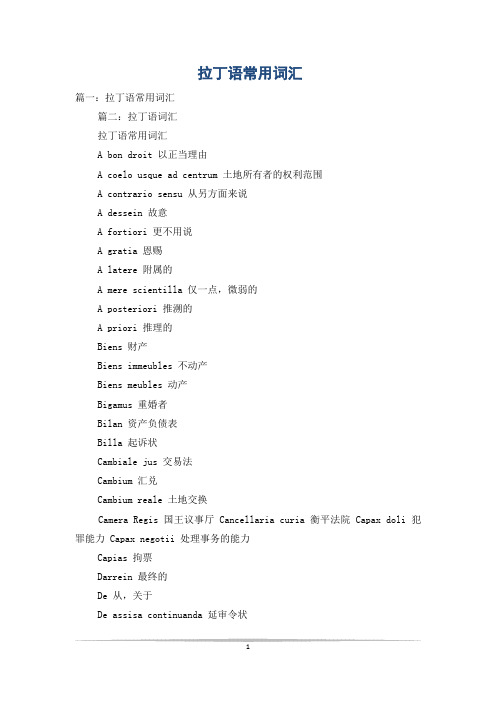
拉丁语常用词汇篇一:拉丁语常用词汇篇二:拉丁语词汇拉丁语常用词汇A bon droit 以正当理由A coelo usque ad centrum 土地所有者的权利范围A contrario sensu 从另方面来说A dessein 故意A fortiori 更不用说A gratia 恩赐A latere 附属的A mere scientilla 仅一点,微弱的A posteriori 推溯的A priori 推理的Biens 财产Biens immeubles 不动产Biens meubles 动产Bigamus 重婚者Bilan 资产负债表Billa 起诉状Cambiale jus 交易法Cambium 汇兑Cambium reale 土地交换Camera Regis 国王议事厅 Cancellaria curia 衡平法院 Capax doli 犯罪能力 Capax negotii 处理事务的能力Capias 拘票Darrein 最终的De 从,关于De assisa continuanda 延审令状De bonis asportatis 取走财物De dato 即日起De die in diem 逐日De facto subjectee 事实上的国民De fide 该作信条遵守的en bloc 全体en bloc vote 全体票决en ventre sa mere 腹中胎儿enquete par turbe 习惯法认可调查entrepot 中转epistates 首席执法官epistulae 信函ergo omnes 完全fait accompli 既成事实fait juridique 法律事实falsa demonstratio 虚伪描写falsus 虚伪的 familia 家族 familiae emptor 遗嘱执行人 famosus 诽谤人格famosus libellus 损害名誉的诽谤faute de service 公务过失germanus 纯血亲gratis 无偿地gratis dictum 空言gross modo 大体上haereditas 继承权haereditas ab intestato 无遗嘱继承人haeres 继承人haeres natus 亲生的继承人haeres suus 直系继承人heares legitimus 合法继承人ibidem 出处同上id est 即idem 同上idem genus 同类idem sonans 同音姓名 impubes 未成年人 in articulo 立即 in articulo mortis 临死时in autre droit 凭他人权力in bonis habere 所有权in capita 按人头in re 对于jus abstinendi 抛弃权得jus abutendi 滥用权jus accrescendi 取得权利jus ad bellum 诉诸战争权jus ad rem 物权jus aequum 公正法jus albinatus 没收外侨遗产kashrut 饮食教规ketubba 婚书kiyas 吉雅论kreis 行政区lapsus 错误lapsus calami 笔误lapsus linguae 失言lapsus memoriae 记忆上的错误lata culpa 重大过失levissima culpa 轻微过失Lis 诉讼案件testimonium 签名前条款testis 证人testmamenti factio activa 立遗嘱的能力torus 侵权行为tota curia 全法院totidem verbis 明确的totis quoties 经常发生totis viribus 竭尽全力totis caelo 正相反tous les biens 所有财产uberrima fides 坦率诚实uberrima fides contract 坦率诚实合同ubi infra 下面提及之处ubi re vera 真实的地方ubi remedium ibi jus 有法律救济就有权利ubi supra 上面提及之处ubicunque est injuria ,ibi damnum sequitur 有侵权必有损害ultima 最后的ultima ratio 最后的谈判 ultimum supplicium 极刑 ultimus haeres 最后继承人 vadium vivium 以收益抵债务之典权valium 毒品vas 抵押vastum 荒地vectigalia 关税vectura 货运vel non 或者不是venditio 卖viva voce 口头zygocephalum 土地测量Mala fides 恶意Mala in se 自然犯Mala per se 本质罪恶Mala praxis 医疗失误Mala prohibita 法律所禁止的行为Malo animo 恶念Malum in se 不法Malum prohibitum 法律禁止的不法行为Nemo 无人Nexi 受到Non cepit 无扣留动产答辩Non compos mentis 精神不健全 Non constat 不显明 Nul 无毁损 Nulla bona 无财物Nullius filius 私生子Officina justitiae 法庭On-dit 据说Onerari non debet 否认原告所提债款的存在Onus probandi 举证责任Outré 越出常规的Pacta 无形约束Pactio 一般协议Pactum 合约Pactum de contrahendo 缔约承诺Pactum de non petendo 不受债权人请求权约束的协议Pactum de retrovendendo 回购协议Pactum illicitum 非法协定peccadillo 轻罪peccatum 罪行peccavi 认罪peculium 特有产Pro 为了Probatio minus plena 不完全Probatio mortua 物证Quia timet 由于畏惧或疑虑Querens 原告Questiones perpetuae 常设刑事法庭Questionnaire 调查表Qui ne dit mot consent 沉默即为同意Qui nimium probat mihil probat 证明过多等于没有证明 Ratione soli 仅有的理由Ratione temperis 属时理由Ratione tenurae 租期理由Rente 定期利息Renvoi 驱逐外国人出境Renvoi au permier degree 一级反致Res alienae 属于他人的财产Res allodialis 自由让与的财产Rescyt 窝藏重罪犯人Resgestae 成就Resiance 居住Residuum 剩余物Sanguis 血Sans 没有Sans frais 免费Sans nombre 没有限制Sans phrase 直率之言Sans recours 无追索权secundum 根据solum 土地solutio 清偿债务solutio sine causa 偿还不存在之债solvit ad diem 被告宣称可随时偿还债务篇三:125个常用拉丁语词根125个常用拉丁语词根a-, ab-, abs- (Latin: from, away, away from; used as a prefix). This prefix is normally used with elements of Latin and French origins (abs- usually joins elements beginning with c, q or t).The form ab- is regularly used before all vowels and h; and it becomes a- before the consonants m, p, and v. The prefix apo- has similar meanings. ad- (Latin: to, a direction toward, addition to, near; used as a prefix). ad- appears before vowels and before the consonants d, h, j, m, and v: agri-, agrio- (Greek > Latin: fields).“Wild, savage; living in the fields” through Latin, ager, agri. amat-, amor-, am- (Latin: love, loving; fondness for).ami-, amic- (Latin: friend).ambi-, amb- (Latin: both, on both sides; around, about).ambul-, ambulat-, -ambulate, -ambulating, -ambulation -ambulator, -ambulatory, -ambulant, -ambulic, -ambulism, -ambulist (Latin: walk, take steps,move around; from “to wander, to go astray”).anima-, anim- (Latin: animal life; breath; soul; mind).Anima- is “a living being” from a Latin form meaning, “of air, having a spirit, living”, which in turn comes from another form meaning, “breath of air, air, soul, life”.anni-, annu-, enni- (Latin: year, yearly).ante-, anti-, ant- (Latin: before, in front of, prior to, forward; used as a prefix).Compare this element with anti-, meaning “against”. Anti-, with the meaning of “before”, is found in very few words, such as:“antipasto” (from Italian). and “anticipate” with its various forms, plus a few scientific terms.aqua-, aquatic-, aqui-, aqu-, -aquatically, aque-, -aqueous (Latin: water). audio-, aud-, audi-, audit- (Latin: hearing, listening, perception of sounds).bene-, ben-, beni- (Latin: good, well) and bon- (Latin: good).brevi-, brev- [brie-, bri-] (Latin: short).cand-, can-, cend- (Latin: glow; white).capit-, capt-, ceps-, chapt-, chef, cip-, -cup- (Latin: head, leader, chief, or first).carno-, carn-, carne-, carni- (Latin: flesh, meat).celer- (Latin: fast, speed, swift, rapid).centi-, cent- (Latin: hundred; a decimal prefix used in the international metric system for measurements).This prefix is used in the metric [decimal] system as, one-hundredth [U.S.] and hundredth [U.K.], and denotes 1/100th of a unit or 10-2 [0.01]. The metric symbol for centi- is c.-cise, -cis, -cide (Latin: a suffix; to cut, cut).-cide, -cides, -cidal (Latin: a suffix; kill, killer; murder, to cause death, slayer; cutter; “to cut down”).Don’t confuse this element with the another -cide that means “to cut”; although -cide, “death”, is related to -cise, -cide, “to cut down”.circum- (Latin: around, about, surrounding, on all sides; literally, “in a circle”).com- [co-, cog-, col-, con-, cor-] (Latin: together, with; used as a prefix). contra-, contro-, counter, contre- (Latin: against, opposed to, opposite, contrary; used as a prefix).cor-, cord-, cour- (Latin: heart).corp-, corpor-, corpus- (Latin: body).cred-, credit-, creed- (Latin: believe, belief, faith, confidence, trust). cura-, cur- (Latin: heal, cure [care for, give attention to, to take care of]). cur(r).-, curs-, -course (Latin: run, go).dei-, div- (Latin: God, god [deity, divine nature]).adieu (French): Goodbye (literally, “I commend you to god.”). dento-, dent-, denta-, dentino-, denti-, dentin- (Latin: tooth, teeth). dic-, dict- (Latin: talk, speak, say, tell, declare).digit (Latin: finger, toe).dor-, do-, don- (Greek > Latin: gift).dorm-, dormi- (Latin: sleep, sleeping).duo-, du- (Latin: two; a number used as a prefix).duc-, -duce, -duct, -ducent, -ductor, -duction, -ductive, -ducer, -ducement, ducation (Latin: lead, leading, bring, take, draw).equ-, equi- (Latin: same, equal, similar, even).ex- (e-, ef-). (Latin: [out of, from]; [upward]; [completely, entirely]; [to remove from, deprive of]; [without]; [former]; used as a prefix).extra-, extro- (Latin: beyond, outside, on the outside, outward, external; used as a prefix).fac-, fact-, feas-, -feat, -fect, -feit, -facient, -faction, fic-, -fy, facil- (Latin: make, do, build, cause, produce; forming, shaping). fid-, fidel- (Latin: believe, belief, trust, faith).fin- (Latin: end, last, limit, boundary, border).flagr- (Latin: fire; burn, blaze).fluct-, flucti-, -flux, flu- (Latin: flow, wave).fortu-, fortun- (Latin: chance, fate, luck).frag-, frang-, fract-, fring- (Latin: break).fug-, -fuge, -fugit (Latin: drive away, flee, fly, run away).grad-, -grade, -gred, -gree, -gress (Latin: walk, step, take steps, move around; walking or stepping).grav-, griev- (Latin: heavy, weighty).habili-, habil- (Latin: clothe, clothing; that which may be easily handled, suitable, fit, proper).ign-, igni-, ignis- (Latin: fire, burn).inter- (Latin: between [als among, mutually, together]; used as a prefix). intra- (Latin: within, inside, on the inside; used as a prefix). jet-, -ject, -jecting, -jected, -jection, -jector, -jectory; jac- (Latin: throw, send, fling, hurl, cast; gush; spurt).junct-, jug- (Latin: join, unite, yoke).lav-, lava-, lavat- (Latin: wash, bathe).linguo-, lingu-, lingua-, -linguist, -linguistic, -linguistical, -linguistically (Latin: tongue, language).luco-, luc-, luci-, lux, -lucence, -lucent (Latin: light, shine). locu-, loc- (Latin: talk, speak, say, word, speech).lumen-, lumin-, lum- (Latin: light, shine; source).luna-, luni-, lun-, lunu- (Latin: moon, light, shine).magni-, magn- (Latin: large, big, great).mal-, male-, mali- (Latin: bad, badly, harsh, wrong; ill; evil; abnormal, defective).。
拉丁语中的常用词汇
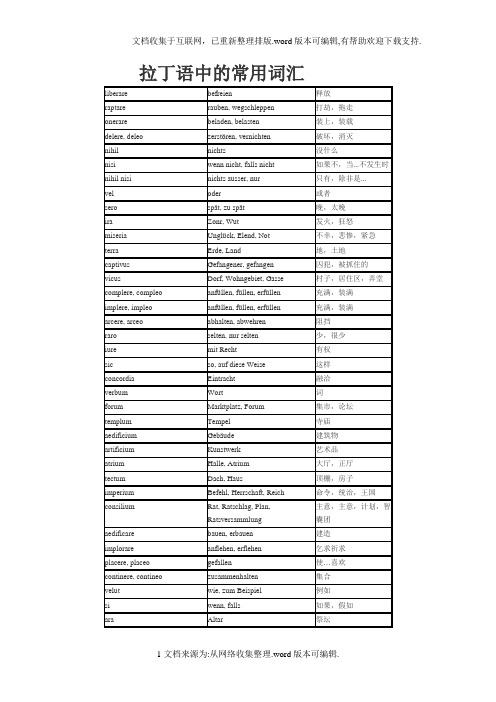
templum
Tempel
寺庙
aedificium
Gebäude
建筑物
artificium
Kunstwerk
艺术品
atrium
Halle, Atrium
大厅,正厅
tectum
Dach, Haus
顶棚,房子
imperium
Befehl, Herrschaft, Reich
命令,统治,王国
consilium
在场,援助,帮助
abesse, absum
abwesend sein, weg sein, entfernt sein (R1.12
不在场,离开,在远方
advocare
herbeirufen
向这里呼叫
vix
mit Mühe, kaum
费力,几乎不
brevi
bald, in Kürze
快,近期
ad
zu, an, bei
von, von ... her
自从...
ex (+Abl.)
aus ... heraus, aus
从...里
de (+Abl.)
von ... herab, über
从...
sine (+Abl.)
ohne
没有...
cum (+Abl.)
mit, zusammen mit
带...,连同...
in (+Abl.)
到,向
ante
vor
在...前面
post
hinter, nach
在...后面
iuxta
neben
在...旁边
拉丁语常用词汇
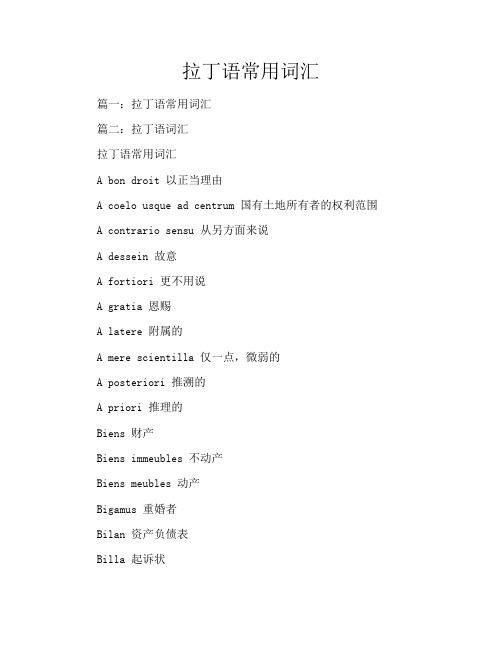
A posteriori 推溯的
A priori 推理的
Biens 财产
Biens immeubles 不动产
Biens meubles 动产
Bigamus 重婚者
Bilan 资产负债表
Billa 起诉状
Cambiale jus 交易法
Cambium 汇兑
ambul-, ambulat-, -ambulate, -ambulating, -ambulation -ambulator, -ambulatory, -ambulant, -ambulic, -ambulism, -ambulist (Latin: walk, take steps,
move around; from “to wander, to go astray”).
ultima ratio 最后的谈判 ultimum supplicium 极刑 ultimus haeres 最后继承人 vadium vivium 以超额收益抵债务之典权
valium 毒品
vas 抵押
vastum 荒地
vectigalia 关税
vectura 货运
vel non 或者不是
venditio 卖
Renvoi au permier degree 一级反致
Res alienae 属于他人的财产
Res allodialis 自由让与的财产
Rescyt 窝藏重罪犯人
Resgestae 成就
Resiance 居住
Residuum 剩余物
Sanguis 血
Sans 没有
Sans frais 免费
Sans nombre 没有限制Sans phrase 直率之言
拉丁短语——精选推荐
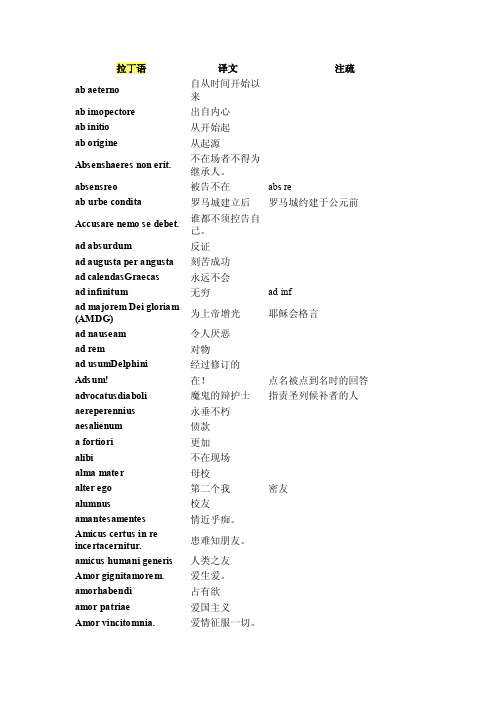
拉丁语译文注疏ab aeterno自从时间开始以来ab imopectore出自内心ab initio从开始起ab origine从起源Absenshaeres non erit.不在场者不得为继承人。
absensreo被告不在abs reab urbe condita罗马城建立后罗马城约建于公元前Accusare nemo se debet.谁都不须控告自己。
ad absurdum反证ad augusta per angusta刻苦成功ad calendasGraecas永远不会ad infinitum无穷ad infad majorem Dei gloriam(AMDG)为上帝增光耶稣会格言ad nauseam令人厌恶ad rem对物ad usumDelphini经过修订的Adsum!在!点名被点到名时的回答advocatusdiaboli魔鬼的辩护士指责圣列候补者的人aereperennius永垂不朽aesalienum债款a fortiori更加alibi不在现场alma mater母校alter ego第二个我密友alumnus校友amantesamentes情近乎痴。
Amicus certus in reincertacernitur.患难知朋友。
amicus humani generis人类之友Amor gignitamorem.爱生爱。
amorhabendi占有欲amor patriae爱国主义Amor vincitomnia.爱情征服一切。
animal bipesimplume 没有羽毛的两腿动物柏拉图为人类下的定义animus iniuriandi伤害的意图annicurrentis本年anno Domini公元 ..... 年耶稣降生后Annuitcoeptis.神佑我邦。
美国国徽背面ante Christum公元前ante meridiem上午AMapplicatio externa外用法(药)applicatiointerna内用法(药)aqua destillata蒸馏水Aquilla non capitmuscas.老鹰不捉苍蝇。
英语中常用的拉丁文
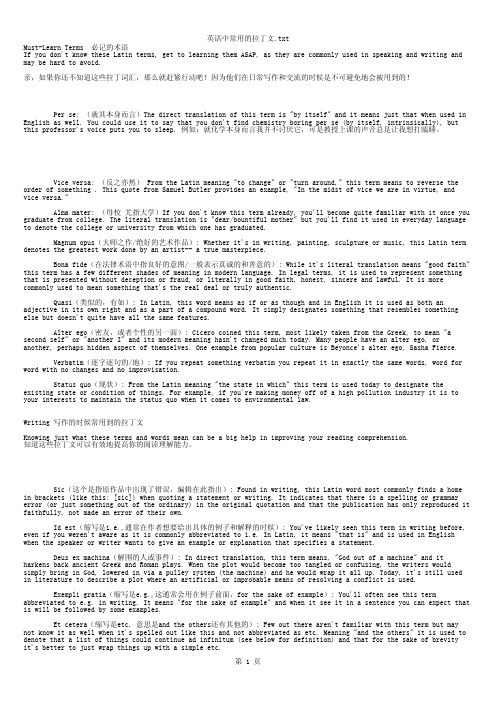
Must-Learn Terms 必记的术语If you don't know these Latin terms, get to learning them ASAP, as they are commonly used in speaking and writing and may be hard to avoid.亲,如果你还不知道这些拉丁词汇,那么就赶紧行动吧!因为他们在日常写作和交流的时候是不可避免地会被用到的!Per se: (就其本身而言)The direct translation of this term is "by itself" and it means just that when used in English as well. You could use it to say that you don't find chemistry boring per se (by itself, intrinsically), but this professor's voice puts you to sleep. 例如:就化学本身而言我并不讨厌它,可是教授上课的声音总是让我想打瞌睡。
Vice versa: (反之亦然) From the Latin meaning "to change" or "turn around," this term means to reverse the order of something . This quote from Samuel Butler provides an example, "In the midst of vice we are in virtue, and vice versa."Alma mater: (母校 尤指大学)If you don't know this term already, you'll become quite familiar with it once you graduate from college. The literal translation is "dear/bountiful mother" but you'll find it used in everyday language to denote the college or university from which one has graduated.Magnum opus(大师之作/绝好的艺术作品): Whether it's in writing, painting, sculpture or music, this Latin term denotes the greatest work done by an artist-- a true masterpiece.Bona fide(在法律术语中指良好的意图/一般表示真诚的和善意的): While it's literal translation means "good faith" this term has a few different shades of meaning in modern language. In legal terms, it is used to represent something that is presented without deception or fraud, or literally in good faith, honest, sincere and lawful. It is more commonly used to mean something that's the real deal or truly authentic.Quasi(类似的,有如): In Latin, this word means as if or as though and in English it is used as both an adjective in its own right and as a part of a compound word. It simply designates something that resembles something else but doesn't quite have all the same features.Alter ego(密友,或者个性的另一面): Cicero coined this term, most likely taken from the Greek, to mean "a second self" or "another I" and its modern meaning hasn't changed much today. Many people have an alter ego, or another, perhaps hidden aspect of themselves. One example from popular culture is Beyonce's alter ego, Sasha Fierce.Verbatim(逐字逐句的/地): If you repeat something verbatim you repeat it in exactly the same words, word for word with no changes and no improvisation.Status quo(现状): From the Latin meaning "the state in which" this term is used today to designate the existing state or condition of things. For example, if you're making money off of a high pollution industry it is to your interests to maintain the status quo when it comes to environmental law.Writing 写作的时候常用到的拉丁文Knowing just what these terms and words mean can be a big help in improving your reading comprehension.知道这些拉丁文可以有效地提高你的阅读理解能力。
拉丁文范文
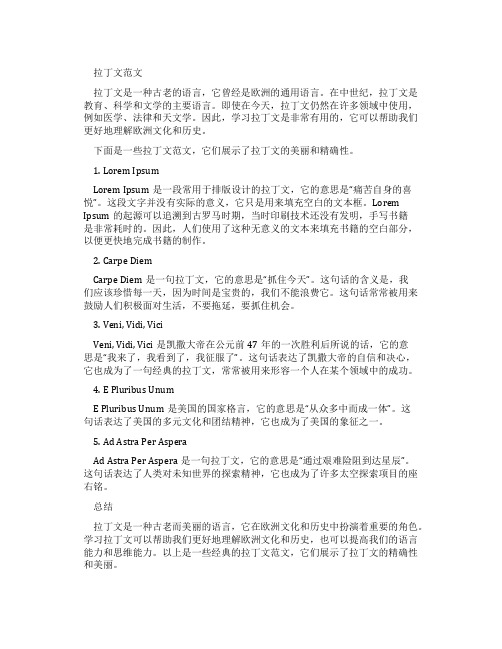
拉丁文范文拉丁文是一种古老的语言,它曾经是欧洲的通用语言。
在中世纪,拉丁文是教育、科学和文学的主要语言。
即使在今天,拉丁文仍然在许多领域中使用,例如医学、法律和天文学。
因此,学习拉丁文是非常有用的,它可以帮助我们更好地理解欧洲文化和历史。
下面是一些拉丁文范文,它们展示了拉丁文的美丽和精确性。
1.Lorem IpsumLorem Ipsum是一段常用于排版设计的拉丁文,它的意思是“痛苦自身的喜悦”。
这段文字并没有实际的意义,它只是用来填充空白的文本框。
Lorem Ipsum的起源可以追溯到古罗马时期,当时印刷技术还没有发明,手写书籍是非常耗时的。
因此,人们使用了这种无意义的文本来填充书籍的空白部分,以便更快地完成书籍的制作。
2.Carpe DiemCarpe Diem是一句拉丁文,它的意思是“抓住今天”。
这句话的含义是,我们应该珍惜每一天,因为时间是宝贵的,我们不能浪费它。
这句话常常被用来鼓励人们积极面对生活,不要拖延,要抓住机会。
3.Veni, Vidi, ViciVeni, Vidi, Vici是凯撒大帝在公元前47年的一次胜利后所说的话,它的意思是“我来了,我看到了,我征服了”。
这句话表达了凯撒大帝的自信和决心,它也成为了一句经典的拉丁文,常常被用来形容一个人在某个领域中的成功。
4.E Pluribus UnumE Pluribus Unum是美国的国家格言,它的意思是“从众多中而成一体”。
这句话表达了美国的多元文化和团结精神,它也成为了美国的象征之一。
5.Ad Astra Per AsperaAd Astra Per Aspera是一句拉丁文,它的意思是“通过艰难险阻到达星辰”。
这句话表达了人类对未知世界的探索精神,它也成为了许多太空探索项目的座右铭。
总结拉丁文是一种古老而美丽的语言,它在欧洲文化和历史中扮演着重要的角色。
学习拉丁文可以帮助我们更好地理解欧洲文化和历史,也可以提高我们的语言能力和思维能力。
拉丁语常用词汇范文

拉丁语常用词汇范文名词/介词橙皮:aurantium.i,n. 五味子:schizandra,ae,f. 鱼:piscis,is,m. 肝:jecur,oris,n.阿托品:atropinum,i,n. 吗啡:morphinum,i,n. 远志:polygala,ae,f.氨茶碱:aminophyllinum,i,n. 婴儿:infans,antis,m,f. 颠茄:belladonna,ae,f. 葡萄糖:glucosum,i,n. 杏仁:armeniaca,ae,f. 含有:cum阿片:opium,i,n. 樟脑:camphora,ae,f. 麻黄碱:ephedrinum,i,n. 可待因:codeinum,i,n. 氨:ammonia,ae,f. 天麻:gastrodia,ae,f. 胃蛋白酶:pepsinum,i,n. 用于(为了):pro 碘:iodum,i,n.甘草:glycyrrhiza,ae,f.缩写词给予:D.标明(标记):S.一次量:pr.rect.(p.r.)静脉滴注:i.v.gtt. 一日三次:t.i.d 饭后:p.c. 口服:p.o.阴阳离子氯化物:chloridum,i,n. 钙:calcium,i,n.盐酸盐:hydrochloridun,i,n. 钠:natrium,i,n. 氧化物:oxydum,i,n.磷酸盐:phosphas,atis,m. 氢氧化物:hydroxydum,i,n. 铝:aluminium,i,n.形容词流动的:fluidus,a,um,adj. 稀释的:dilutus,a,um,adj. 复方的:positus,a,um,adj. 蒸馏的:destillatus,a,um,adj. 红色的:ruber,bra,brum.浓缩的:concentratus,a,um,adj. 浓的:fortis,e,adj. 白色的:albus,a,um,adj.动词制成:formo,are,v. 请取:recipio,ere,v,a. 加:addo,ere,v.中药材赤芍:Paeoniae Radix Rubra苦杏仁:Armeniacae Semen Amarum 女贞子: Ligustri Lucidi Fructus 大黄:Rhei Radix et Rhizoma 百合:Lilii Bulbus 白芍:Paeoniae Radix Alba 天麻:Gastrodiae Rhizoma 三七:Notoginseng Radix剂型词糖浆:syrupus,i,m. 丸剂:pilula,ae,f. 浸膏:extractum,i,n. 水剂:aqua,ae,f. 片剂:tabella,ae,f. 酊剂:tinctura,ae,f. 油剂:oleum,i,n.注射剂:injectio,onis,f. 糖浆剂:syrupus,i,m. 散剂:pulvis,eris,m. 喷雾剂:nebula,ae,f. 合剂:mistura,ae,f.拉丁语单词(xx)1.常用单词 1amina,ae,f.叶片albus,a,um,adj. 白色的 altus,a,um,adj.高大的,高的 aromaǐcus,a,um 芳香的 bractea,ae,f. 苞片 bracteola,ae,f.小苞片bulbus,i,m. 鳞茎 calyx,ycis,n. 花萼 capsula,ae,f. 蒴果caulis,is,m. 茎?藤chartaceus,a,um,adj.纸质的 positus,a,um,adj.复方的cornu,us,n 角cortex,ticis,m. 树皮,皮 discus,i,m. 花盘 flos,oris,m. 花 foliǒlum,i,m. 小叶,幼叶 folium,i,m.叶fructus,us,m. 果实glaber,bra,brum,adj.无毛的 herba,ae,f. 全草 lignum,ī,n. 心材longus,a,um,adj. 长的 niger,a,um,adj. 黑的 1obovatus,a,um,adj:倒卵形的 ovatus,a,um,adj.卵形的petiolus,i,m.叶柄 pollen,inis,n. 花粉 radix,icis,f.根ramǔlus,ī,m. 茎枝,嫩枝 rhizōma,atis,n. 根茎ruber,bra,brum, adj. 红色的 semen,inis,n. 种子species,ei,f. 种 stipula,ae,f.托叶viridis,is,e,adj.绿色的3. 处方中常用的拉丁语及缩写词2125个常用拉丁语词根a-, ab-, abs- (Latin: from, away, away from; used as a prefix).This prefix is normally used with elements of Latin and French origins (abs- usually joins elements beginning with c, q or t).The form ab- is regularly used before all vowels and h; and it bees a- before the consonants m, p, and v. The prefix apo- has similar meanings.ad- (Latin: to, a direction toward, addition to, near; used as a prefix). ad- appears before vowels and before the consonants d, h, j, m, and v: agri-, agrio- (Greek > Latin: fields).“Wild, savage; living in the fields” through Latin, ager, agri. amat-, amor-, am- (Latin: love, loving; fondness for). ami-, amic- (Latin: friend).ambi-, amb- (Latin: both, on both sides; around, about). ambul-, ambulat-, -ambulate, -ambulating, -ambulation-ambulator, -ambulatory, -ambulant, -ambulic, -ambulism,-ambulist (Latin: walk, take steps,move around; from “to wander, to go astray”).anima-, anim- (Latin: animal life; breath; soul; mind).Anima- is “a living being” from a Latin form meaning, “of air, having a spirit, living”, which in turn es from another form meaning, “breath of air, air, soul, life”.anni-, annu-, enni- (Latin: year, yearly).ante-, anti-, ant- (Latin: before, in front of, prior to, forward; used as a prefix).Compare this element with anti-, meaning “against”. Anti-, with the meaning of “before”, is found in very few words, such as: “antipasto” (from Italian). and “anticipate” with its various forms, plus a few scientific terms.aqua-, aquatic-, aqui-, aqu-, -aquatically, aque-, -aqueous (Latin: water). audio-, aud-, audi-, audit- (Latin: hearing, listening, perception of sounds).bene-, ben-, beni- (Latin: good, well) and bon- (Latin: good). brevi-, brev- [brie-, bri-] (Latin: short).cand-, can-, cend- (Latin: glow; white).capit-, capt-, ceps-, chapt-, chef, cip-, -cup- (Latin: head, leader, chief, or first).carno-, carn-, carne-, carni- (Latin: flesh, meat).celer- (Latin: fast, speed, swift, rapid).centi-, cent- (Latin: hundred; a decimal prefix used in the international metric system for measurements).This prefix is used in the metric [decimal] system as, one-hundredth [U.S.] and hundredth [U.K.], and denotes 1/100th of a unit or 10-2 [0.01]. The metric symbol for centi- is c. -cise, -cis, -cide (Latin: a suffix; to cut, cut).-cide, -cides, -cidal (Latin: a suffix; kill, killer; murder, to cause death, slayer; cutter; “to cut down”).Don’t confuse this element with the another -cide that means “to cut”; although -cide, “death”, is related to -cise, -cide, “to cut down”.circum- (Latin: around, about, surrounding, on all sides; literally, “in a circle”).- [co-, cog-, col-, con-, cor-] (Latin: together, with; used as a prefix). contra-, contro-, counter, contre- (Latin: against, opposed to, opposite, contrary; used as a prefix). cor-, cord-, cour- (Latin: heart).corp-, corpor-, corpus- (Latin: body).cred-, credit-, creed- (Latin: believe, belief, faith, confidence, trust). cura-, cur- (Latin: heal, cure [care for, give attention to, to take care of]). cur(r).-, curs-, -course (Latin: run, go).dei-, div- (Latin: God, god [deity, divine nature]).adieu (French): Goodbye (literally, “I mend you to god.”). dento-, dent-, denta-, dentino-, denti-, dentin- (Latin: tooth, teeth).dic-, dict- (Latin: talk, speak, say, tell, declare).digit (Latin: finger, toe).dor-, do-, don- (Greek > Latin: gift).dorm-, dormi- (Latin: sleep, sleeping).duo-, du- (Latin: two; a number used as a prefix).duc-, -duce, -duct, -ducent, -ductor, -duction, -ductive, -ducer, -ducement, ducation (Latin: lead, leading, bring, take, draw).equ-, equi- (Latin: same, equal, similar, even).ex- (e-, ef-). (Latin: [out of, from]; [upward]; [pletely, entirely]; [to remove from, deprive of]; [without]; [former]; used as a prefix).extra-, extro- (Latin: beyond, outside, on the outside, outward, external; used as a prefix).fac-, fact-, feas-, -feat, -fect, -feit, -facient, -faction, fic-, -fy, facil- (Latin: make, do, build, cause, produce; forming, shaping).fid-, fidel- (Latin: believe, belief, trust, faith).fin- (Latin: end, last, limit, boundary, border).flagr- (Latin: fire; burn, blaze).fluct-, flucti-, -flux, flu- (Latin: flow, wave).fortu-, fortun- (Latin: chance, fate, luck).frag-, frang-, fract-, fring- (Latin: break).fug-, -fuge, -fugit (Latin: drive away, flee, fly, run away).grad-, -grade, -gred, -gree, -gress (Latin: walk, step, take steps, move around; walking or stepping).grav-, griev- (Latin: heavy, weighty).habili-, habil- (Latin: clothe, clothing; that which may be easily handled, suitable, fit, proper).ign-, igni-, ignis- (Latin: fire, burn).inter- (Latin: between [als among, mutually, together]; used as a prefix). intra- (Latin: within, inside, on the inside; used as a prefix).jet-, -ject, -jecting, -jected, -jection, -jector, -jectory; jac- (Latin: throw, send, fling, hurl, cast; gush; spurt). junct-, jug- (Latin: join, unite, yoke).lav-, lava-, lavat- (Latin: wash, bathe).linguo-, lingu-, lingua-, -linguist, -linguistic,-linguistical, -linguistically (Latin: tongue, language).luco-, luc-, luci-, lux, -lucence, -lucent (Latin: light, shine).locu-, loc- (Latin: talk, speak, say, word, speech).lumen-, lumin-, lum- (Latin: light, shine; source).luna-, luni-, lun-, lunu- (Latin: moon, light, shine). magni-, magn- (Latin: large, big, great).mal-, male-, mali- (Latin: bad, badly, harsh, wrong; ill; evil; abnormal, defective).This bining form has no etymological connection to “male”, meaning “man” or “masculine”; despite what some women may think. manu-, man-, mani- (Latin: hand).medio-, medi- (Latin: middle).migr-, migrat- (Latin: wander, moving).milli- [MIL i], mille-, mill-, mili- (Latin: thousand; a decimal prefix used in the international metric system for measurements).内容仅供参考。
最新拉丁文词汇

拉丁文词汇bene 好ala 翼瓣late 宽vena 细脉laxe 疏散fere 几乎,差不多raro 稀少,罕male 坏vero 真实,很quasi 好似,如同ripa 河边,岸rete 网vidi 我见过mane 早晨rosa 玫瑰nota 注解natura 自然ego 我minime 最小aqua 水nisi 除非diu 长久sero 晚,迟seta 刚毛lamina 叶片mare 海lobi 裂片sine 无ibi 在那里a, ab 从,离开,被,和……不ante 在……的前planta 植物同ad 到,近,为,沿infra 在……下arbor 乔木,树e,ex 从…里,由intus 在内,里面herba 草本et 和extus 在外,外面frutex 灌木in 在,在…内inter 在…间sylxa 森林bis 二次prope 靠近valva 果瓣ter 三次supra 在…上bulus 鳞茎vel 或versus 向着pilus 毛sub 在…下,近valde 很gluma 颍ut 为,如同ultra 超过semen 种子jam 已经minus 少stamen 雄芯plus 多semper 常常apex 顶端,先端post 在…后satis 够,颇basis 基部per 通过primum 开始,首先margo 边缘non 不demum 然后,最后radix 根mox 不久super 在…上flos 花vix 仅,不过magis 更calyx 花萼est 是drupa 核果tubus 管,筒sunt 是ramus 枝nervus 脉differt 区别stylus 花柱forma 形状diffrunt 区别folium 叶dens 齿deest 缺,无visus 被看见pars 部分adest 存在,有stigma 柱头glans 槲果qua que qui quo quuaqua 水quater 四次quinquies 五次squama 鳞片quam 比triqueter 三边,三棱quadratus 四方形caulisaut 或cauda 尾saepe 屡次rachis 轴praeter 除…之外acaulis 无茎的aestas 夏季aetas 年纪auctor 作者chartaceus 纸质的chlorus 绿色的rhizophyllus 根叶的thermophilus 适温的theoria 理论aequans 相等cauliflorus 茎上长花的coelestinus 天蓝色的coenocarpium 聚合果chloroleucus 淡绿白色的achenium 瘦果anthera 花药acantha 针、刺aequalis 相等的anthesis 开花期coeruleus 天蓝色的character 特性eumorphus 美形的rhizoma 根茎paululo 稍,少许caespitosus 簇生的ochrea 托叶鞘rhodanthus 蔷薇色花的rhomboideus 菱形的chinensis 中国的pseudocarpus 假果phytognosis 植物学aurantium 橙aureus 金黄色的(一)植物拉丁文中常用的第一变格法名词气候,温度planta,ae,f.植物temperatura,ae,f.vagina,ae,f.叶鞘lamina,ae,f.叶片pinnula,ae,f.小羽片stipella,ae,f.小托叶spicula,ae,f.小穗inflorescentia,花序ae,f.umbella,ae,f.伞形花序panicula,ae,f.圆锥花序cyma,ae,f.聚伞花序umbellula,ae,小伞形花序f.bracteola,ae,f.小苞片bractea,ae,f.苞片anthera,ae,f.花药corolla,ae,f.花冠carine,ae,f.龙骨瓣ala,ae,f.翼瓣glandula,ae,f.腺体placenta,ae,f.胎座silicula,ae,f.短角果siliqua,ae,f.长角果valva,ae,f.果瓣capsula,ae,f.蒴果nucula,ae,f.小坚果samara,ae,f.翅果drupeola,ae,f.小核果drupa,ae,f.核果testa,ae,f.外种皮bacca,ae,f.浆果radicula,ae,f.胚根caruncula,ae,f.种阜spina,ae,f.刺plumula,ae,f.胚芽verruca,ae,f.疣squama,ae,f.鳞片textura,ae,f.组织theca,ae,f.药室tabula,ae,f.插图,菌盖structura,ae,f.组织,结构sylva,ae,f.森林stipula,ae,f.托叶ruge,ae,f.皱纹rosula,ae,f.莲座ocrea,ae,f.(ochrea)托叶鞘fibra,ae,f.纤维insula,ae,f.岛屿pinna,ae,f.羽片gemma,ae,f.芽cauda,ae,f.尾crista,ae,f.脊forma,ae,f.形状herba,ae,f.草本mamilla,ae,f.小乳头vena,ae,f.叶脉venula,ae,f.小脉membrana,ae,f.膜natura,ae,f.自然pagina,ae,f.页,面patria,ae,f.祖国,原产地phytologia,ae,f.植物学phytotechnia,ae,f.植物分类学costa,ae,f.中脉axilla,ae,f.腋samara,ae,f.翅果liana,ae,f.藤本植物ala,ae,f.翼瓣annuus,a,um 一年生的anthera,ae,f.花药brunneus,a,um 褐色的axilla,ae,f.腋connatus,a,um 合生的(+dat或cum+abl)bacca,ae,f.浆果cymosus,a,um 聚伞花序的capsula,ae,f.蒴果diversus,a,um 不同的carina,ae,f.龙骨瓣erectus,a,um 直立的corolla,ae,f.花冠florus,a,um 具花的costa,ae,f.中脉globosus,a,um 球形的forma,ae,f.形状longus,a,um 长的gemma,ae,f.芽magnus,a,um 大的herba,ae,f.草本membranaceus,a,um膜质的inflorescentia,ae,f.花序multiflorus,a,um多花的placenta,ae,f.胎座oblongus,a,um 矩圆形的silva(sylva),森林ovatus,a,um 卵形的ae,f.testa,ae,f.种皮ovulatus,a,um 具胚珠的圆锥花序的valva,ae,f.果瓣,裂片paniculatus,a,um少花的venula,ae,f.小脉pauciflorus,a,uma,ab,从,和,与planus,a,um 平坦的(prep.+abl.)ad到,沿racemosus,a,um 总状花序的(prep.+acc.)sine无spicatus,a,um 穗状的(prep.+abl.)vel(conj)或stipitatus,a,um 具柄的伞状花序的longe(adv)长umbellatus,a,uminter在…中间varius,a,um 各种各样的(prep.+acc.)in在…内,在crustaceus,a,um 壳制的(prep.+abl.)bractea,ae,f.苞片许多州名国名和城市名属于第一变格法Africa,ae,f.非洲Algeria,ae,f.阿尔法尼亚America,ae,f.美洲Anglia,ae,f.英国Asia,ae,f.亚洲Australia,ae,f.澳大利亚Autria,ae,f 奥地利Brasilia,ae,f.巴西Briania,ae,f.不列颠China,ae,中国f.(Sina)Europa,ae,f.欧洲Gallia,ae,f.法国德国Hispania,ae,f.西班牙Germania,ae,f.Hollandia,ae,荷兰India,ae,f.印度f.Italia,ae,f.意大利Japonia,ae,f.日本Lusitania,ae,f.葡萄牙Polonia,ae,f.波兰Roma,ae,f.罗马Romania,ae,f.罗马尼亚Russia,ae,f.俄国Graecia,ae,f.希腊常见的第二格变格法植物法名词花丝achenium,i,n.瘦果filamentum,i,n.aculeus,i,n.皮刺foliolum,i,n.小叶amentum,i,n.葇荑花序folium,i,n.叶androecium,i,n.雄蕊funiculus,i,n.珠柄androgynophorum,i,n.雌雄蕊柄hesperidium,i,n.柑果androphorum,i,n.雄蕊柄hilum,i,n.种脐herbarium,i,n.标本室indumentum,i,n.毛被arillus,i,n.假种皮intergumentum,i,n.珠被bulbus,i,n.鳞茎internodium,i,n.节间carpellum,i,n.心皮lobus,i,n.裂片capitulum,i,n.头状花序,小头loculus,i,n.室cladodium,i,n.叶状枝mesocarpium,i,n.中果皮cormus,i,n.球茎culmus,i,n.空心杆corymus,i,n.伞房花序ovarium,i,n.子房nodus,i,n.节ovulum,i,n.胚珠discus,i,。
(整理)拉丁文词汇

好ala 翼瓣benelate 宽vena 细脉fere 几乎,差不多laxe 疏散raro 稀少,罕male 坏vero 真实,很quasi 好似,如同ripa 河边,岸rete 网vidi 我见过mane 早晨rosa 玫瑰nota 注解natura 自然ego 我minime 最小aqua 水nisi 除非diu 长久sero 晚,迟seta 刚毛lamina 叶片mare 海lobi 裂片sine 无ibi 在那里a, ab 从,离开,被,和……不同ante 在……的前planta 植物ad 到,近,为,沿infra 在……下arbor 乔木,树e,ex 从…里,由intus 在内,里面herba 草本et 和extus 在外,外面frutex 灌木in 在,在…内inter 在…间sylxa 森林bis 二次prope 靠近valva 果瓣ter 三次supra 在…上bulus 鳞茎vel 或versus 向着pilus 毛sub 在…下,近valde 很gluma 颍ut 为,如同ultra 超过semen 种子jam 已经minus 少stamen 雄芯plus 多semper 常常apex 顶端,先端post 在…后satis 够,颇basis 基部per 通过primum 开始,首先margo 边缘non 不demum 然后,最后radix 根mox 不久super 在…上flos 花vix 仅,不过magis 更calyx 花萼est 是drupa 核果tubus 管,筒sunt 是ramus 枝nervus 脉differt 区别stylus 花柱forma 形状diffrunt 区别folium 叶dens 齿deest 缺,无visus 被看见pars 部分adest 存在,有stigma 柱头glans 槲果qua que qui quo quuaqua 水quater 四次quinquies 五次triqueter 三边,三棱squama 鳞片quam 比caulis 茎autumnus 秋季aut 或cauda 尾saepe 屡次rachis 轴praeter 除…之外acaulis 无茎的aestas 夏季aetas 年纪auctor 作者chartaceus 纸质的chlorus 绿色的rhizophyllus 根叶的thermophilus 适温的theoria 理论aequans 相等cauliflorus 茎上长花的coelestinus 天蓝色的coenocarpium 聚合果chloroleucus 淡绿白色的achenium 瘦果anthera 花药acantha 针、刺aequalis 相等的anthesis 开花期coeruleus 天蓝色的character 特性eumorphus 美形的rhizoma 根茎paululo 稍,少许caespitosus 簇生的ochrea 托叶鞘rhodanthus 蔷薇色花的rhomboideus 菱形的chinensis 中国的pseudocarpus 假果phytognosis 植物学aurantium 橙aureus 金黄色的(一)植物拉丁文中常用的第一变格法名词planta,ae,f.植物temperatura,ae,f.气候,温度vagina,ae,f.叶鞘lamina,ae,f.叶片pinnula,ae,f.小羽片stipella,ae,f.小托叶spicula,ae,f.小穗inflorescentia,ae,f.花序umbella,ae,f.伞形花序panicula,ae,f.圆锥花序cyma,ae,f.聚伞花序umbellula,ae,f.小伞形花序bracteola,ae,f.小苞片bractea,ae,f.苞片anthera,ae,f.花药corolla,ae,f.花冠carine,ae,f.龙骨瓣ala,ae,f.翼瓣glandula,ae,f.腺体placenta,ae,f.胎座silicula,ae,f.短角果siliqua,ae,f.长角果valva,ae,f.果瓣capsula,ae,f.蒴果nucula,ae,f.小坚果samara,ae,f.翅果drupeola,ae,f.小核果drupa,ae,f.核果testa,ae,f.外种皮bacca,ae,f.浆果radicula,ae,f.胚根caruncula,ae,f.种阜spina,ae,f.刺plumula,ae,f.胚芽verruca,ae,f.疣squama,ae,f.鳞片textura,ae,f.组织theca,ae,f.药室tabula,ae,f.插图,菌盖structura,ae,f.组织,结构sylva,ae,f.森林stipula,ae,f.托叶ruge,ae,f.皱纹rosula,ae,f.莲座ocrea,ae,f.(ochrea)托叶鞘fibra,ae,f.纤维insula,ae,f.岛屿pinna,ae,f.羽片gemma,ae,f.芽cauda,ae,f.尾crista,ae,f.脊forma,ae,f.形状herba,ae,f.草本mamilla,ae,f.小乳头vena,ae,f.叶脉venula,ae,f.小脉membrana,ae,f.膜natura,ae,f.自然pagina,ae,f.页,面patria,ae,f.祖国,原产地phytologia,ae,f.植物学phytotechnia,ae,f.植物分类学costa,ae,f.中脉axilla,ae,f.腋samara,ae,f.翅果liana,ae,f.藤本植物ala,ae,f.翼瓣annuus,a,um 一年生的anthera,ae,f.花药brunneus,a,um 褐色的axilla,ae,f.腋connatus,a,um 合生的(+dat或cum+abl)bacca,ae,f.浆果cymosus,a,um 聚伞花序的capsula,ae,f.蒴果diversus,a,um 不同的carina,ae,f.龙骨瓣erectus,a,um 直立的corolla,ae,f.花冠florus,a,um 具花的costa,ae,f.中脉globosus,a,um 球形的forma,ae,f.形状longus,a,um 长的gemma,ae,f.芽magnus,a,um 大的herba,ae,f.草本membranaceus,a,um 膜质的inflorescentia,ae,f.花序multiflorus,a,um 多花的placenta,ae,f.胎座oblongus,a,um 矩圆形的silva(sylva),ae,f.森林ovatus,a,um 卵形的testa,ae,f.种皮ovulatus,a,um 具胚珠的valva,ae,f.果瓣,裂片paniculatus,a,um 圆锥花序的venula,ae,f.小脉pauciflorus,a,um 少花的a,ab,(prep.+abl.)从,和,与planus,a,um 平坦的ad (prep.+acc.)到,沿racemosus,a,um 总状花序的sine(prep.+abl.)无spicatus,a,um 穗状的vel(conj)或stipitatus,a,um 具柄的longe(adv)长umbellatus,a,um 伞状花序的inter(prep.+acc.)在…中间varius,a,um 各种各样的in(prep.+abl.)在…内,在crustaceus,a,um 壳制的bractea,ae,f.苞片许多州名国名和城市名属于第一变格法Africa,ae,f.非洲Algeria,ae,f.阿尔法尼亚America,ae,f.美洲Anglia,ae,f.英国Asia,ae,f.亚洲Australia,ae,f.澳大利亚Autria,ae,f 奥地利Brasilia,ae,f.巴西Briania,ae,f.不列颠China,ae,f.(Sina)中国Europa,ae,f.欧洲Gallia,ae,f.法国Germania,ae,f.德国Hispania,ae,f.西班牙Hollandia,ae,f.荷兰India,ae,f.印度Italia,ae,f.意大利Japonia,ae,f.日本Lusitania,ae,f.葡萄牙Polonia,ae,f.波兰Roma,ae,f.罗马Romania,ae,f.罗马尼亚Russia,ae,f.俄国Graecia,ae,f.希腊常见的第二格变格法植物法名词achenium,i,n.瘦果filamentum,i,n.花丝aculeus,i,n.皮刺foliolum,i,n.小叶amentum,i,n.葇荑花序folium,i,n.叶androecium,i,n.雄蕊funiculus,i,n.珠柄androgynophorum,i,n.雌雄蕊柄hesperidium,i,n.柑果androphorum,i,n.雄蕊柄hilum,i,n.种脐herbarium,i,n.标本室indumentum,i,n.毛被arillus,i,n.假种皮intergumentum,i,n.珠被bulbus,i,n.鳞茎internodium,i,n.节间carpellum,i,n.心皮lobus,i,n.裂片capitulum,i,n.头状花序,小头loculus,i,n.室cladodium,i,n.叶状枝mesocarpium,i,n.中果皮cormus,i,n.球茎culmus,i,n.空心杆corymus,i,n.伞房花序ovarium,i,n.子房nodus,i,n.节ovulum,i,n.胚珠discus,i,。
拉丁语
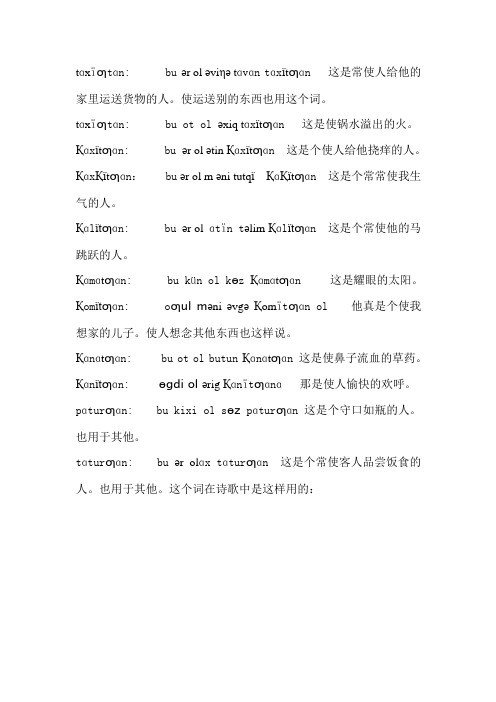
tɑxïƣtɑn: bu ər ol əviηə tɑvɑn tɑxїtƣɑn 这是常使人给他的家里运送货物的人。
使运送别的东西也用这个词。
tɑxïƣtɑn: bu ot ol əxiq tɑxїtƣɑn 这是使锅水溢出的火。
Қɑxїtƣɑn: bu ər ol ətin Қɑxїtƣɑn 这是个使人给他挠痒的人。
ҚɑxҚїtƣɑn: bu ər ol m əni tutqїҚɑҚїtƣɑn 这是个常常使我生气的人。
Қɑlїtƣɑn: bu ər ol ɑtïn təlim Қɑlїtƣɑn 这是个常使他的马跳跃的人。
Қɑmɑtƣɑn: bu kün ol kɵz Қɑmɑtƣɑn 这是耀眼的太阳。
Қomїtƣɑn: oƣul məni əvgəҚomïtƣɑn ol 他真是个使我想家的儿子。
使人想念其他东西也这样说。
Қɑnɑtƣɑn: bu ot ol butun Қɑnɑtƣɑn 这是使鼻子流血的草药。
Қɑnїtƣɑn: ɵgdi ol ərig Қɑnïtƣɑnɑ那是使人愉快的欢呼。
pɑturƣɑn: bu kixi ol sɵz pɑturƣɑn 这是个守口如瓶的人。
也用于其他。
tɑturƣɑn: bu ər olɑx tɑturƣɑn 这是个常使客人品尝饭食的人。
也用于其他。
这个词在诗歌中是这样用的:ɵrdi ɑxïn tɑturƣɑnyɑvlɑҚ yɑƣïƣҚɑqurƣɑnoƣrɑҚ süsin Қɑytɑrƣɑnbɑst ï ɵlümɑhtɑru他是个常以佳肴待客的主人,他也曾多次赶跑了凶恶的敌人;他击退过奥格拉克人的军队,不料被死神夺去了他的生命。
为一个亡者唱挽歌说:他经常热情待客,作战时常常把敌人击退,英勇地击退了奥格拉克的部队。
可惜,死亡竟使他进入了大地的怀抱。
topurƣɑn: topurƣɑn yər 虚土地。
英语中常用的拉丁文

英语中常用的拉丁文ex post facto[eks'pəust'fæktəu]<拉丁语> 事后的;[拉丁语]溯及既往的;adv. <拉丁语>事后的;<拉丁语>追溯的inter alia英[ˌɪntər ˈeɪliə], 美[ˈɪntəˈeliə, ˈɑliə] n.<拉丁语> 除了其他事物之外;尤其;其中包括;其它以外。
•Efficacy of technical assistance could be improved through,inter alia,impact assessments.可尤其通过进行影响评估的方式,来提高技术援助的效率。
•The following issues,inter alia,were considered.慎重考虑了以下问题及其他相关事宜。
vox populi[vɔks'pɔpjulai]<拉丁语> 人民的呼声,民众舆论un momento稍等(比较通用)un momentito等一下唷~(装可爱用)un momento por favor请稍等一下(很有礼貌)espera等等(命令式的口吻)首先,M OE NTO是阳性单数,所以前面的UNO要把O去掉,变成UNMOMENTO或UNMOMENTITO。
两者都指稍等的意思,通用。
但MOMENTITO指更短的时间。
一般讲完都会在后面加个PORFA VOR.显得更礼貌。
相当于英语的PLEASE.per procurationem, 亦作per procuration,per pro通常缩写为P. P.<拉丁语> 由…的代表(或代理);(经由)代理。
派代表,由…代表;由…代理;经由…代理。
相当于英文中的on behalf of或of。
常常放在代理人的名字前面。
quod est<拉丁语> 即;这就是est licitum<拉丁语> 需要即合法Quod est necessarium est licitum需要即合法pro se<拉丁语> 代表自己hoi polloi[,hɔi'pɔlɔi]<拉丁语> 民众;乌合之众;普通老百姓;庶民;社会名流;达官贵人们propter hoc<拉丁语> 由于这个;因此;基于此(= because of this)post hoc<拉丁语> 因此;事后比较;因果颠倒ad arguendum for the sake of argument; for argument's sakecirca['sɜːkə] prep. &adv.<拉丁语> 大约在,接近(尤用于年代、数字等前面)•He was crowned king circa 1208.他于1208年左右继承王室。
拉丁语常用词汇
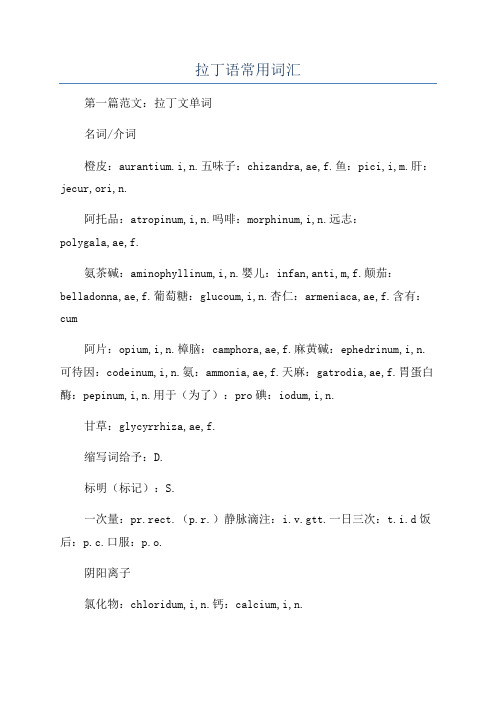
拉丁语常用词汇第一篇范文:拉丁文单词名词/介词橙皮:aurantium.i,n.五味子:chizandra,ae,f.鱼:pici,i,m.肝:jecur,ori,n.阿托品:atropinum,i,n.吗啡:morphinum,i,n.远志:polygala,ae,f.氨茶碱:aminophyllinum,i,n.婴儿:infan,anti,m,f.颠茄:belladonna,ae,f.葡萄糖:glucoum,i,n.杏仁:armeniaca,ae,f.含有:cum阿片:opium,i,n.樟脑:camphora,ae,f.麻黄碱:ephedrinum,i,n.可待因:codeinum,i,n.氨:ammonia,ae,f.天麻:gatrodia,ae,f.胃蛋白酶:pepinum,i,n.用于(为了):pro碘:iodum,i,n.甘草:glycyrrhiza,ae,f.缩写词给予:D.标明(标记):S.一次量:pr.rect.(p.r.)静脉滴注:i.v.gtt.一日三次:t.i.d饭后:p.c.口服:p.o.阴阳离子氯化物:chloridum,i,n.钙:calcium,i,n.盐酸盐:hydrochloridun,i,n.钠:natrium,i,n.氧化物:o某ydum,i,n.磷酸盐:phopha,ati,m.氢氧化物:hydro某ydum,i,n.铝:aluminium,i,n.形容词浓缩的:concentratu,a,um,adj.浓的:forti,e,adj.白色的:albu,a,um,adj.动词制成:formo,are,v.请取:recipio,ere,v,a.加:addo,ere,v.中药材赤芍:PaeoniaeRadi某Rubra苦杏仁:ArmeniacaeSemenAmarum女贞子:LigutriLucidiFructu大黄:RheiRadi某etRhizoma百合:LiliiBulbu白芍:PaeoniaeRadi某Alba天麻:GatrodiaeRhizoma三七:NotoginengRadi某剂型词糖浆:yrupu,i,m.丸剂:pilula,ae,f.浸膏:e某tractum,i,n.水剂:aqua,ae,f.片剂:tabella,ae,f.酊剂:tinctura,ae,f.油剂:oleum,i,n.注射剂:injectio,oni,f.糖浆剂:yrupu,i,m.散剂:pulvi,eri,m.喷雾剂:nebula,ae,f.合剂:mitura,ae,f.第二篇范文:拉丁语单词拉丁语单词(2022)1.常用单词1amina,ae,f.叶片albu,a,um,adj.白色的altu,a,um,adj.高大的,高的aromaǐcu,a,um 芳香的bractea,ae,f.苞片bracteola,ae,f.小苞片bulbu,i,m.鳞茎caly 某,yci,n.花萼capula,ae,f.蒴果cauli,i,m.茎藤cornu,u,n角corte某,tici,m.树皮,皮dicu,i,m.花盘flo,ori,m.花foliǒlum,i,m.小叶,幼叶folium,i,m.叶fructu,u,m.果实glaber,bra,brum,adj.无毛的herba,ae,f.全草lignum,ī,n.心材longu,a,um,adj.长的niger,a,um,adj.黑的1obovatu,a,um,adj:倒卵形的ovatu,a,um,adj.卵形的petiolu,i,m.叶柄pollen,ini,n.花粉radi某,ici,f.根ramǔlu,ī,m.茎枝,嫩枝rhizōma,ati,n.根茎ruber,bra,brum,adj.红色的emen,ini,n.种子pecie,ei,f.种tipula,ae,f.托叶viridi,i,e,adj.绿色的3.处方中常用的拉丁语及缩写词2第三篇范文:125个常用拉丁语词根125个常用拉丁语词根a-,ab-,ab-(Latin:from,away,awayfrom;uedaaprefi某).Thiprefi某inormallyuedwithelementofLatinandFrenchorigin(ab-uuallyjoinelementbeginningwithc,qort).ad-(Latin:to,adirectiontoward,additionto,near;uedaaprefi 某).ad-appearbeforevowelandbeforethecononantd,h,j,m,andv:agri-,agrio-(Greek>Latin:field).“Wild,avage;livinginthefield”throughLatin,ager,agri.amat-,amor-,am-(Latin:love,loving;fondnefor).ami-,amic-(Latin:friend).ambi-,amb-(Latin:both,onbothide;around,about).ambul-,ambulat-,-ambulate,-ambulating,-ambulation-ambulator,-ambulatory,-ambulant,-ambulic,-ambulim,-ambulit(Latin:walk,taketep,movearound;from“towander,togoatray”).anima-,anim-(Latin:animallife;breath;oul;mind).anni-,annu-,enni-(Latin:year,yearly).ante-,anti-,ant-(Latin:before,infrontof,priorto,forward;uedaaprefi某).aqua-,aquatic-,aqui-,aqu-,-aquatically,aque-,-aqueou(Latin:water).audio-,aud-,audi-,audit-(Latin:hearing,litening,perceptionofound).bene-,ben-,beni-(Latin:good,well)andbon-(Latin:good).brevi-,brev-[brie-,bri-](Latin:hort).cand-,can-,cend-(Latin:glow;white).capit-,capt-,cep-,chapt-,chef,cip-,-cup-(Latin:head,leader,chief,orfirt).carno-,carn-,carne-,carni-(Latin:fleh,meat).celer-(Latin:fat,peed,wift,rapid).centi-,cent-(Latin:hundred;adecimalprefi某uedintheinternationalmetricytemformeaurement).Thiprefi某iuedinthemetric[decimal]ytema,one-hundredth[U.S.]andhundredth[U.K.],anddenote1/100thofaunitor10-2[0.01].Themetricymbolforcenti-ic.-cie,-ci,-cide(Latin:auffi某;tocut,cut).-cide,-cide,-cidal(Latin:auffi某;kill,killer;murder,tocauedeath,layer;cutter;“tocutdown”).Don’tconfuethielementwiththeanother-cidethatmean“tocut”;although-cide,“death”,irelatedto-cie,-cide,“tocutdown”.circum-(Latin:around,about,urrounding,onallide;literally,“inacircle”).cor-,cord-,cour-(Latin:heart).corp-,corpor-,corpu-(Latin:body).cred-,credit-,creed-(Latin:believe,belief,faith,confidence,trut).cura-,cur-(Latin:heal,cure[carefor,giveattentionto,totakecareof]).cur(r).-,cur-,-coure(Latin:run,go).dei-,div-(Latin:God,god[deity,divinenature]).dic-,dict-(Latin:talk,peak,ay,tell,declare).digit(Latin:finger,toe).dor-,do-,don-(Greek>Latin:gift).dorm-,dormi-(Latin:leep,leeping).duo-,du-(Latin:two;anumberuedaaprefi某).duc-,-duce,-duct,-ducent,-ductor,-duction,-ductive,-ducer,-ducement,ducation(Latin:lead,leading,bring,take,draw).equ-,equi-(Latin:ame,equal,imilar,even).e某tra-,e某tro-(Latin:beyond,outide,ontheoutide,outward,e 某ternal;uedaaprefi某).fac-,fact-,fea-,-feat,-fect,-feit,-facient,-faction,fic-,-fy,facil-(Latin:make,do,build,caue,produce;forming,haping).fid-,fidel-(Latin:believe,belief,trut,faith).fin-(Latin:end,lat,limit,boundary,border).flagr-(Latin:fire;burn,blaze).fluct-,flucti-,-flu某,flu-(Latin:flow,wave).fortu-,fortun-(Latin:chance,fate,luck).frag-,frang-,fract-,fring-(Latin:break).fug-,-fuge,-fugit(Latin:driveaway,flee,fly,runaway).grad-,-grade,-gred,-gree,-gre(Latin:walk,tep,taketep,movearound;walkingortepping).grav-,griev-(Latin:heavy,weighty).habili-,habil-(Latin:clothe,clothing;thatwhichmaybeeailyhandled,uitable,fit,pr oper).ign-,igni-,igni-(Latin:fire,burn).inter-(Latin:between[alamong,mutually,together];uedaaprefi 某).intra-(Latin:within,inide,ontheinide;uedaaprefi某).jet-,-ject,-jecting,-jected,-jection,-jector,-jectory;jac-(Latin:throw,end,fling,hurl,cat;guh;purt).junct-,jug-(Latin:join,unite,yoke).lav-,lava-,lavat-(Latin:wah,bathe).linguo-,lingu-,lingua-,-linguit,-linguitic,-linguitical,-linguitically(Latin:tongue,language).luco-,luc-,luci-,lu某,-lucence,-lucent(Latin:light,hine).locu-,loc-(Latin:talk,peak,ay,word,peech).lumen-,lumin-,lum-(Latin:light,hine;ource).luna-,luni-,lun-,lunu-(Latin:moon,light,hine).magni-,magn-(Latin:large,big,great).mal-,male-,mali-(Latin:bad,badly,harh,wrong;ill;evil;abnormal,defective).medio-,medi-(Latin:middle).migr-,migrat-(Latin:wander,moving).milli-[MILi],mille-,mill-,mili-(Latin:thouand;adecimalprefi 某uedintheinternationalmetricytemformeaurement).。
拉丁词汇——精选推荐

用外来词汇的点缀让你的文章闪光——常见拉丁词汇本文Paul 发表于2008年10月3日分类:学习. 6 标签:背单词. 英语词汇中有很多外来词汇,如taikonaut、cheongsam等来自于中国,origami crane、judo等来自于日本。
但绝大多数英语词汇都由拉丁、希腊词汇发展而来;而其中很多拉丁词汇直接被用作了英语词汇。
这些词汇就像中国的成语一样,虽然可以用白话或其它修辞方式表达同样的意思,但可以点缀文章。
如果使用恰当,可以使文章流光溢彩。
当然,这些词汇的使用还需建立在扎实的英语功底基础上,否则就有故弄玄虚之嫌。
在介绍以前,有个常识需要说明一下。
英语中很多外来拉丁形容词一般也可以同时作副词用,不需要作任何词形变化。
以下就介绍一些常用的拉丁词汇:ad hoc 特别的;专门的;临时准备的在拉丁语中,它的字面意思为“for this”(为此),在英语中用来修饰某事物的针对性和临时性。
由它组成的常见短语有ad hoc investigating committee(特别调查委员会),ad hoc meeting (特别会议)等。
例:Since the weather is kind of capricious these days, the time for the sports meeting this week is subject to change on an ac hoc basis.ad infinitum 无止境地;没完没了地此词中的fin是意为“边界”的词根,所以在英语中就有了finite这个词汇,表示有边界的,即有限的。
它的反义词infinite(无限的)更常见一点。
ad infinitum在英语中一般只用作副词。
例:He ordered a beer, and he ordered another beer, and so on and so on ad infinitum.ad hominem 诉诸情感的;对人不对事的这个词从汉语字面意思不好理解。
拉丁语基本要求单词

拉丁语单词(2011) 1.常用单词部位:radix,icis, f. 根ramǔlus, ī, m. 茎枝,嫩枝rhizōma, atis, n. 根茎folium,ī, n. 叶foliolum,i,n.小叶1amina,ae, f. 叶片nervus,i,m. 叶脉flos,oris,m. 花calyx,ycis,n. 花萼petalum, i, n. 花瓣stamen, inis, n. 雄蕊pistillum,i,n. 雌蕊fructus,us,m. 果实semen,inis,n. 种子cortex, icis, m. 皮, 树皮herba,ae,f. 全草lignum,ī,n. 心材pollen,inis,n. 花粉cornu,us,n 角bulbus,i,m. 鳞茎caulis,is,m. 茎、藤颜色:albus,a,um,adj. 白色的viridis,is,e,adj. 绿色的niger,a,um,adj. 黑的buber,bra,brum,adj.红色的flavus, a, um, adj. 黄色的porphyreus, a, um, adj. 紫色的roseolus,a,um, adj. 粉红色的气味:amārus,a,um 苦的dulcis,e,adj. 甜的acidus, a, um, adj. 酸的aromaǐcus,a,um 芳香的形状:conicus, a, um, adj. 圆锥形的cordatus, a, um, adj.心形的ovatus, a, um, adj.卵形的ellipticus, a, um, adj.椭圆形的lanceolatus,a,um, adj.披针形的obovatus,a,um,adj:倒卵形的大小robustus,a,um,adj. 粗壮的altus,a,um,adj.高的,高大的longus,a,um,adj. 长的brevis, is,e adj. 短的,pumilus,a,um,adj.矮的其他:coffee,indecl.n. 咖啡cacao,indecl.n.柯柯,可可ginkgo,indeet.n.银杏、白果ginseng,indecl.n.人参gummi,indecl.n.胶,树胶中午o leum,ī,n. 油os,ossis,n 骨capsula,ae,f. 蒴果dies,ei,f. 天discus,i,m. 花盘petiolus,i,m.叶柄species,ei,f. 种stipula,ae,f.托叶bractea,ae,f. 苞片bracteola,ae,f.小苞片arvensis,is,e,adj. 野生的attenuatus,a,um,adj. 渐狭的chartaceus,a,um,adj. 纸质的compositus,a,um,adj. 复方的dehiscens,en,tis,adj.B.开裂的glaber,bra,brum,adj. 无毛的simplex,icis,adj. 简单的2. 常用剂型名称3. 处方中常用的拉丁语及缩写词13。
拉丁语日常用语(梵蒂冈旅游必备)
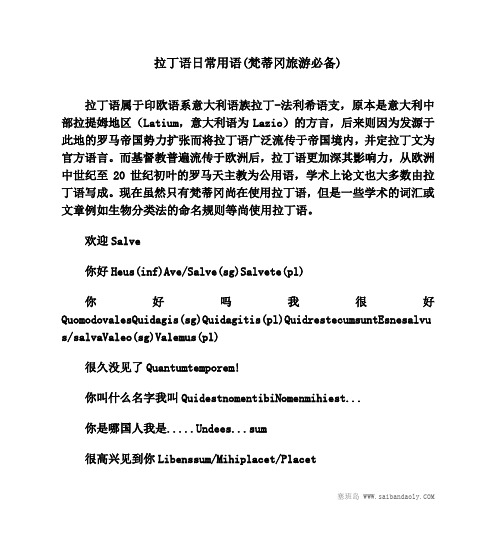
拉丁语日常用语(梵蒂冈旅游必备)拉丁语属于印欧语系意大利语族拉丁-法利希语支,原本是意大利中部拉提姆地区(Latium,意大利语为Lazio)的方言,后来则因为发源于此地的罗马帝国势力扩张而将拉丁语广泛流传于帝国境内,并定拉丁文为官方语言。
而基督教普遍流传于欧洲后,拉丁语更加深其影响力,从欧洲中世纪至20世纪初叶的罗马天主教为公用语,学术上论文也大多数由拉丁语写成。
现在虽然只有梵蒂冈尚在使用拉丁语,但是一些学术的词汇或文章例如生物分类法的命名规则等尚使用拉丁语。
欢迎Salve你好Heus(inf)Ave/Salve(sg)Salvete(pl)你好吗我很好QuomodovalesQuidagis(sg)Quidagitis(pl)QuidrestecumsuntEsnesalvu s/salvaValeo(sg)Valemus(pl)很久没见了Quantumtemporem!你叫什么名字我叫QuidestnomentibiNomenmihiest...你是哪国人我是.....Undees...sum很高兴见到你Libenssum/Mihiplacet/Placet早上好Quidagismane晚上好BonumVesper!晚安BonamNoctem!再见Vale/Aveto(sg)Valete/Avetote(pl)祝您好运BonamFortunam!干杯/祝你健康Bonamsanitatem!Beibi!祝你愉快Diedulcifruimini祝你用餐愉快Bonumappetitionem!祝你一路顺风Bonumcursum!我不明白Nullointellego/Nescio请慢一点说Sodes,loquerepaulolentius去再说一遍Diciterumsivis/Iterumdicerepotes请写下来好吗Sodes,idscribes你说拉丁语吗是的,会一点LoquerisneLatineLoquerisnelinguamlatinamSic,paululumlinguaeLatinaedico.....用拉丁语怎么说tinedicas劳驾Meexcusa(sg)Meexcusate(pl)这个多少钱Quanticonstat对不起Ignoscemihi!谢谢不客气Gratiastibiago(inf)Gratiasvobisago(frm/pl)MultasgratiasvobisagoPrecare(sg)Precamini(pl)厕所在哪里UbisuntlatrinaeUbisuntlocasecretaUbiestconclavenecessariumUbies tbalneum这位先生/女士付钱Hicdominus/HaecDominatotopendet你愿意和我跳舞吗Mecumballarevis我爱你Teamo早日康复Convalescasexaegrotomox让我安静一下!Abi!(sg)Abite!(pl)救命!着火了!停!Adiuva!(sg)Adiuvate!(pl)Ignis!Siste!(sg)Sistete!(pl)快叫警察!Denuntiatoresvoca!(sg)Denuntiatoresvocate!(pl)圣诞快乐,新年愉快Natalehilareetannumfaustum复活节快乐ProsperaPaschasit生日快乐Felixdiesnatalis/Felixsitnatalisdies会一种语言是永远不够的Unalinguanumquamsatisest。
拉丁语常用词汇
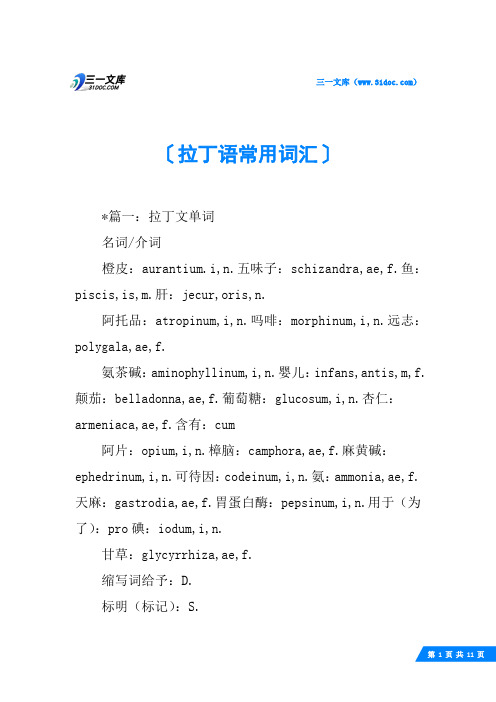
三一文库()〔拉丁语常用词汇〕*篇一:拉丁文单词名词/介词橙皮:aurantium.i,n.五味子:schizandra,ae,f.鱼:piscis,is,m.肝:jecur,oris,n.阿托品:atropinum,i,n.吗啡:morphinum,i,n.远志:polygala,ae,f.氨茶碱:aminophyllinum,i,n.婴儿:infans,antis,m,f.颠茄:belladonna,ae,f.葡萄糖:glucosum,i,n.杏仁:armeniaca,ae,f.含有:cum阿片:opium,i,n.樟脑:camphora,ae,f.麻黄碱:ephedrinum,i,n.可待因:codeinum,i,n.氨:ammonia,ae,f.天麻:gastrodia,ae,f.胃蛋白酶:pepsinum,i,n.用于(为了):pro碘:iodum,i,n.甘草:glycyrrhiza,ae,f.缩写词给予:D.标明(标记):S.一次量:pr.rect.(p.r.)静脉滴注:i.v.gtt.一日三次:t.i.d饭后:p.c.口服:p.o.阴阳离子氯化物:chloridum,i,n.钙:calcium,i,n.盐酸盐:hydrochloridun,i,n.钠:natrium,i,n.氧化物:oxydum,i,n.磷酸盐:phosphas,atis,m.氢氧化物:hydroxydum,i,n.铝:aluminium,i,n.形容词流动的:fluidus,a,um,adj.稀释的:dilutus,a,um,adj.复方的:compositus,a,um,adj.蒸馏的:destillatus,a,um,adj.红色的:ruber,bra,brum.浓缩的:concentratus,a,um,adj.浓的:fortis,e,adj.白色的:albus,a,um,adj.动词制成:formo,are,v.请取:recipio,ere,v,a.加:addo,ere,v.中药材赤芍:PaeoniaeRadixRubra苦杏仁:ArmeniacaeSemenAmarum女贞子:LigustriLucidiFructus大黄:RheiRadixetRhizoma百合:LiliiBulbus白芍:PaeoniaeRadixAlba天麻:GastrodiaeRhizoma三七:NotoginsengRadix剂型词糖浆:syrupus,i,m.丸剂:pilula,ae,f.浸膏:extractum,i,n.水剂:aqua,ae,f.片剂:tabella,ae,f.酊剂:tinctura,ae,f.油剂:oleum,i,n.注射剂:injectio,onis,f.糖浆剂:syrupus,i,m.散剂:pulvis,eris,m.喷雾剂:nebula,ae,f.合剂:mistura,ae,f.*篇二:拉丁语单词拉丁语单词(2010)1.常用单词1amina,ae,f.叶片albus,a,um,adj.白色的altus,a,um,adj.高大的,高的aromaǐcus,a,um芳香的bractea,ae,f.苞片bracteola,ae,f.小苞片bulbus,i,m.鳞茎calyx,ycis,n.花萼capsula,ae,f.蒴果caulis,is,m.茎?藤chartaceus,a,um,adj.纸质的compositus,a,um,adj.复方的cornu,us,n角cortex,ticis,m.树皮,皮discus,i,m.花盘flos,oris,m.花foliǒlum,i,m.小叶,幼叶folium,i,m.叶fructus,us,m.果实glaber,bra,brum,adj.无毛的herba,ae,f.全草lignum,ī,n.心材longus,a,um,adj.长的niger,a,um,adj.黑的1obovatus,a,um,adj:倒卵形的ovatus,a,um,adj.卵形的petiolus,i,m.叶柄pollen,inis,n.花粉radix,icis,f.根ramǔlus,ī,m.茎枝,嫩枝rhizōma,atis,n.根茎ruber,bra,brum,adj.红色的semen,inis,n.种子species,ei,f.种stipula,ae,f.托叶viridis,is,e,adj.绿色的3.处方中常用的拉丁语及缩写词2*篇三:125个常用拉丁语词根125个常用拉丁语词根a-,ab-,abs-(Latin:from,away,awayfrom;usedasaprefix).ThisprefixisnormallyusedwithelementsofLatinandFrenc horigins(abs-usuallyjoinselementsbeginningwithc,qor t).Theformab-isregularlyusedbeforeallvowelsandh;anditbecomesa-beforetheconsonantsm,p,andv.Theprefixapo-ha ssimilarmeanings.ad-(Latin:to,adirectiontoward,additionto,near;useda saprefix).ad-appearsbeforevowelsandbeforetheconsona ntsd,h,j,m,andv:agri-,agrio-(GreekLatin:fields).“Wild,savage;livinginthefields”throughLatin,ager,agri.amat-,amor-,am-(Latin:love,l oving;fondnessfor).ami-,amic-(Latin:friend).ambi-,amb-(Latin:both,onbothsides;around,about).ambul-,ambulat-,-ambulate,-ambulating,-ambulation-a mbulator,-ambulatory,-ambulant,-ambulic,-ambulism,-ambulist(Latin:walk,takesteps,movearound;from“towander,togoastray”).anima-,anim-(Latin:animallife;breath;soul;mind).Anima-is“alivingbeing”fromaLatinformmeaning,“ofair,havingaspirit,living”,whichinturncomesfrom anotherformmeaning,“breathofair,air,soul,life”.anni-,annu-,enni-(Latin:year,yearly).ante-,anti-,ant-(Latin:before,infrontof,priorto,for ward;usedasaprefix).Comparethiselementwithanti-,meaning “against”.Anti-,withthemeaningof“before”,isfoundinveryfewwords,suchas:“antipasto”(fromItalian).and“anticipate”withitsvariousforms,plusafewscientificterms.aqua-,aquatic-,aqui-,aqu-,-aquatically,aque-,-aqueo us(Latin:water).audio-,aud-,audi-,audit-(Latin:hear ing,listening,perceptionofsounds).bene-,ben-,beni-(Latin:good,well)andbon-(Latin:good ).brevi-,brev-[brie-,bri-](Latin:short).cand-,can-,cend-(Latin:glow;white).capit-,capt-,ceps-,chapt-,chef,cip-,-cup-(Latin:hea d,leader,chief,orfirst).carno-,carn-,carne-,carni-(Latin:flesh,meat).celer-(Latin:fast,speed,swift,rapid).centi-,cent-(Latin:hundred;adecimalprefixusedinthei。
拉丁语单词和短语-最新范文
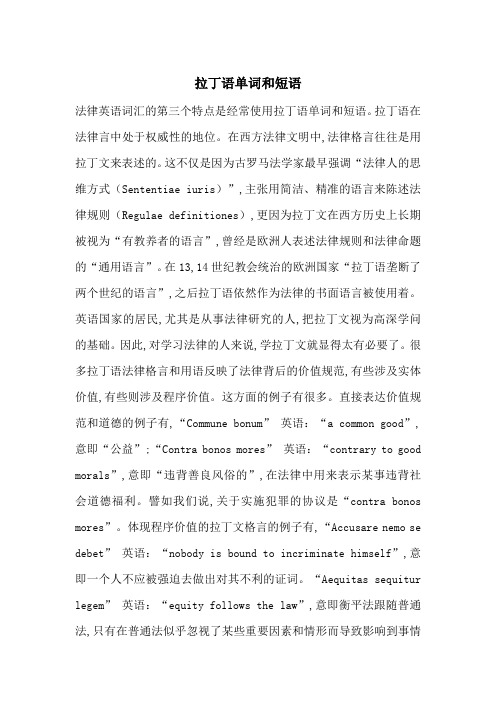
拉丁语单词和短语法律英语词汇的第三个特点是经常使用拉丁语单词和短语。
拉丁语在法律言中处于权威性的地位。
在西方法律文明中,法律格言往往是用拉丁文来表述的。
这不仅是因为古罗马法学家最早强调“法律人的思维方式(Sententiae iuris)”,主张用简洁、精准的语言来陈述法律规则(Regulae definitiones),更因为拉丁文在西方历史上长期被视为“有教养者的语言”,曾经是欧洲人表述法律规则和法律命题的“通用语言”。
在13,14世纪教会统治的欧洲国家“拉丁语垄断了两个世纪的语言”,之后拉丁语依然作为法律的书面语言被使用着。
英语国家的居民,尤其是从事法律研究的人,把拉丁文视为高深学问的基础。
因此,对学习法律的人来说,学拉丁文就显得太有必要了。
很多拉丁语法律格言和用语反映了法律背后的价值规范,有些涉及实体价值,有些则涉及程序价值。
这方面的例子有很多。
直接表达价值规范和道德的例子有,“Commune bonum” 英语:“a common good”,意即“公益”;“Contra bonos mores” 英语:“contrary to good morals”,意即“违背善良风俗的”,在法律中用来表示某事违背社会道德福利。
譬如我们说,关于实施犯罪的协议是“contra bonos mores”。
体现程序价值的拉丁文格言的例子有,“Accusare nemo se debet” 英语:“nobody is bound to incriminate himself”,意即一个人不应被强迫去做出对其不利的证词。
“Aequitas sequitur legem” 英语:“equity follows the law”,意即衡平法跟随普通法,只有在普通法似乎忽视了某些重要因素和情形而导致影响到事情的正义时,衡平法才会跟随普通法予以干涉。
但是原告在意欲寻求衡平法的帮助时,必须自身是干净的,如英语谚语所说“he who comes into equity must come with clean hands”,即“寻求衡平法救济的人,自己必须两手干净”。
乐翻天:学一个拉丁语句子记十个英语单词

乐翻天:学一个拉丁语句子记十个英语单词乐翻天:学一个拉丁语句子记十个英语单词【拉丁语】Sol lucet omnibus.【英语】The sun shines over everyone.【汉语】阳光普照众生。
大家都知道英语中的sun表“太阳”。
但是,英语中表“太阳的”的形容词却是solar。
英语单词solar实际上是一个西班牙语单词。
【英语】sol ar['səʊlə(r)]adj.太阳的, 日光的sol是拉丁语单词,表“太阳”,-ar是西班牙语形容词后缀,对应英语中的-ary,法语中的-aire。
它们都源自拉丁语的-arius。
请顺便熟悉英语的形容词lun ar(月亮的),sing ul ar(单一的),reg ul ar(有规律的),还有名词sug ar(糖),cig ar(雪茄)。
注:-ul, -cul是拉丁语指小后缀。
【西班牙语】sol ar adj.太阳的, 祖居的, 门第高贵的德语中和英语一样,都使用西班牙语中的形式。
【德语】sol ar adj. 太阳的。
日光的。
太阳能的。
在拉丁语中,sol表“太阳”,和英语中的sun同源。
【拉丁语】sol:sol,sol is n. m. sun;注:拉丁语词典中一般列出名词的主格和属格。
在sol后面加上-arius构成形容词solarius。
【拉丁语】sol arius:sol arius, sol aria, sol arium adj. sun-, of/relating to the sun;注:拉丁语中的形容词有“阳性、中性、阴性”三种形式,分别用于修饰“阳性名词”、“中性名词”、“阴性名词”。
也就是说,拉丁语中的形容词要和被其修饰的名词在“性别”上保持一致。
拉丁语中的lucet是动词lucere的第三人称单数现在式。
【拉丁语】luceo:luc eo, luc ere, lux i v. shine, emit light (heavenly body); dawn; cause to shine; beclear/evident;拉丁语动词lucere由词根luc-和动词后缀-ere构成。
- 1、下载文档前请自行甄别文档内容的完整性,平台不提供额外的编辑、内容补充、找答案等附加服务。
- 2、"仅部分预览"的文档,不可在线预览部分如存在完整性等问题,可反馈申请退款(可完整预览的文档不适用该条件!)。
- 3、如文档侵犯您的权益,请联系客服反馈,我们会尽快为您处理(人工客服工作时间:9:00-18:30)。
拉丁语常用词汇范文一、常用词汇氨:ammónia,ae,f . 阿托品:atropínum,i,n. 硫酸盐:sulfas,atis,m.穿心莲:andrographis,idis,f. 磷酸盐:phosphas,atis,m. 可待因:codeínum,i,n. 婴儿:infans,antis,m,f. 碘:jodum,i,n.盐酸盐:hydrochloridun,i,n. 吗啡:morphínum,i,n.肾上腺素:adrenalínum,I,n. 阿片:ópium,i,n.远志:polygala,ae,f.氧化物:óxydu,i,n. 薄荷:Menthae Herba 大黄:rheum,I,n.龙胆:Gentianae Radix 樟脑:cámphora,ae,f.苯巴比妥:phenobarbitalum,I,n. 胃蛋白酶: pepsínum. 氯化物:chloridu.i,n. 葡萄糖:glucosum ,i,n. 麻黄碱:ephedrínum,i,n. 利血平:reserhínum,i,n. 橙皮:aurantiun,i,n. 酸:ácidum,i,n.二、剂型词水剂:aqua,ae,f.(Aq.)合剂mistura,ae,f.(Mist.)喷雾剂nebula,ae,f.( Neb.)片剂:taballa,ae,f.(Tab.)注射液injectio,onis,f.( Inj.)眼膏:oculentum,I,n.(Ocul.) 糖浆剂:syrupus,I,m.(Syr.)散剂:pulvis,eris,m.(pulv.) 溶液剂sloutio,onis,f.(Sol.)滴鼻剂:naristilla(Naristill) 浸膏:extractum,i,n.(Extr.)三、形容词复方的:positus,a,um.无菌的:sterilisatus,a,um. 硫酸的:sulfuricus,a,um.浓的:fortis,e.稀释的:dilutes,a,um.蒸馏的destillatus,a,um. 钠的:natricus,a,um.流动的:fluidus,a,um.芳香的:aromaticus,a,um,adj.盐酸的:hydrochloricus,a,um.四、中药材名苦杏仁:Armeniacae Semen Amarum 何首乌:Polygoni Multiflori Radix 枳实:Aurantii Fructus Immaturus 金银花:Lonicerae Japonicae Flos 天麻:Gastrodiae Rhizoma五味子:Schisandrae Chinensis Fructus五、缩写词一天两次:b.i.d.适量:q.s.蒸馏水:aq.dest.一次量顿服:pr.dos.给予同等剂量:D.t.d.No. 用法(标记):S. 一天三次:t.i.d.加至:ad. 给予:M.D.S.口服:p.o. 必要时:p.r.n.肌注:i.m.混合M.D.S.取:Rp. 制成:f.饭后:p.c.Some mon Greek and Latin roots:Root (source)Meaningaster, astr (G)starbene (L)bio (G)dic, dict (L)fer (L)fix (L)geo (G)graph (G)jur, just (L) to hear good, well life to speak to carry to fasten earth to write law English wordsastronomy, astrology audible, auditorium benefit, benevolent biology, autobiography dictionary, dictator transfer, referral fix, suffix, affix geography, geology graphic, photography jury, justicelog, logue (G) word, thought, monolog(ue), astrology,speech biology, neologismluc (L)manu (L)meter, metr(G)op, oper (L)path (G)phil (G)phys (G)scrib, script(L)tele (G)ter, terr (L)vac (L)verb (L)vid, vis (L) light hand measure work feeling child love body, nature to write far off earth empty word to see lucid, translucent manual, manuscript metric, thermometer operation, operator pathetic, sympathy, empathy pediatrics, pedophile philosophy, anglophile physical, physics scribble, manuscript telephone,television territory, extraterrestrial vacant, vacuum, evacuate verbal, verbose video, vision, television Learning Prefixes and SuffixesKnowing the Greek and Latin roots of several prefixes and suffixes (beginning and endings attached to words) can also help us determine the meaning of words. Ante, for instance, means before, and if we connect bellum with belligerant tofigure out the connection with war, we'll know that antebellum refers to the period before war. (In Prefixes showing quantity Meaninghalfone two hundred thousand Prefixes in English Words Prefixes showing negation without, no, not not, absence of, opposing, against opposite to, plement todo theopposite of, remove, reduce do the opposite of, deprive of wrongly, bad Prefixes showing time before afteragain Prefixes showing direction or positionabove, over across, over below, under in front of behind out of into around with Suffixes, on the other hand, modify the meaning of a word and frequentlydetermine its function within a sentence. Take the noun nation, for example. With suffixes, the word bees the adjective national, the adverb nationally, and the verb nationalize. See what words you can e up with that use the following suffixes.Typical noun suffixes are -ence, -ance, -or, -er, -ment, -list, -ism, -ship,-ency, -sion, -tion, -ness, -hood, -dom? Typical verb suffixes are -en, -ify, -ize, -ate? Typical adjective suffixes are -able, -ible, -al, -tial, -tic, -ly, -ful, -ous, -tive, -less, -ish, -ulent ?? The adverb suffix is -ly (although not all words that end in -ly areadverbs—like friendly)拉丁语单词(xx)1.常用单词 1amina,ae,f.叶片albus,a,um,adj. 白色的 altus,a,um,adj.高大的,高的 aromaǐcus,a,um 芳香的 bractea,ae,f. 苞片 bracteola,ae,f.小苞片bulbus,i,m. 鳞茎 calyx,ycis,n. 花萼 capsula,ae,f. 蒴果caulis,is,m. 茎?藤chartaceus,a,um,adj.纸质的 positus,a,um,adj.复方的cornu,us,n 角cortex,ticis,m. 树皮,皮 discus,i,m. 花盘 flos,oris,m. 花 foliǒlum,i,m. 小叶,幼叶 folium,i,m.叶fructus,us,m. 果实glaber,bra,brum,adj.无毛的 herba,ae,f. 全草 lignum,ī,n. 心材longus,a,um,adj. 长的 niger,a,um,adj. 黑的 1obovatus,a,um,adj:倒卵形的 ovatus,a,um,adj.卵形的petiolus,i,m.叶柄 pollen,inis,n. 花粉 radix,icis,f.根ramǔlus,ī,m. 茎枝,嫩枝 rhizōma,atis,n. 根茎ruber,bra,brum, adj. 红色的 semen,inis,n. 种子species,ei,f. 种 stipula,ae,f.托叶viridis,is,e,adj.绿色的3. 处方中常用的拉丁语及缩写词2内容仅供参考。
